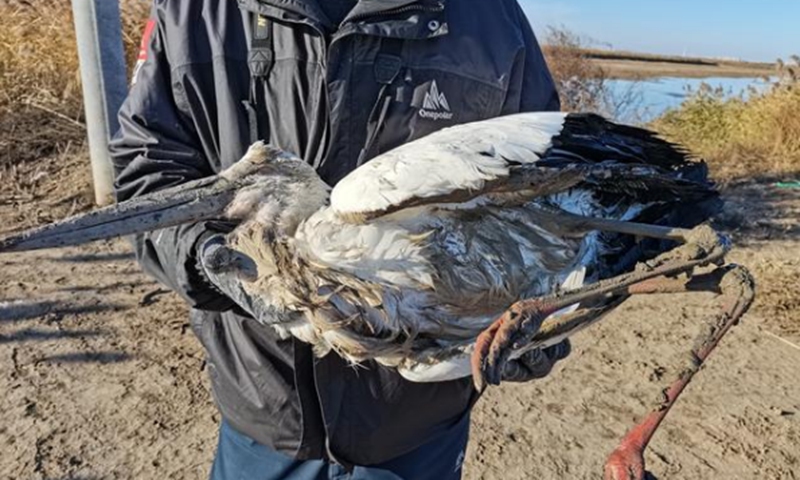25 oriental white storks found dead in N China's Tianjin, cause of death unknown: volunteers

Photo: thepaper.cn
At least 25 oriental white storks, a migratory bird under first-class national protection in China, have been found dead of unknown reasons in their temporary habitat in North China's Tianjin since Sunday, an environment protection volunteer told the Global Times Tuesday. Two of the birds are receiving treatment.
The volunteer, Wang Jianmin, said the birds had symptoms relating to poisoning and had no wounds.
Three other oriental white storks were forced to fly into high-voltage lines by someone who set firecrackers. Two of the bird were found dead, while the other was rescued by a local animal hospital, said Wang.
Local authorities have started an investigation, according to a Monday report by thepaper.cn, which said 11 oriental white storks had been found dead.
Lu Jun, director of the National Bird Banding Center of China, told the Global Times that a steering group from China's forestry authority arrived in Tianjin on Tuesday morning to provide guidance, and an expert from the center also went to the city to join the investigation.
"One of the dead oriental white storks had been banded by our center, which indicates that it was a bird that our college found in the Yellow River delta wetland in May," said Lu. The cause of death of the birds remains unknown.
Wang, together with other volunteers, found the dead birds at the junction of the Binhai New Area of Tianjin and a farm in Beijing. "On Sunday morning, we found three, and the next day, we found 19," Wang sighed.
He and his team members remain at the habitat to continue searching for other birds.
In early November, farmers set firecrackers to drive away some white storks that had landed in their fish ponds close to the Qilihai national wetland reserve in Tianjin, said Wang.
The wetland is about five kilometers from where the volunteers found the dead birds.
The oriental white stork is listed as endangered by the International Union for Conservation of Nature. Every year, they migrate from the north of China to spend winter in the south of China.
"Tianjin is an important stop and they usually arrive in late October and stay for about two months before heading south," Wang said. "A record-breaking 5,000 oriental white storks arrived in Tianjin."
The volunteers have been in the area to safeguard the birds since October 19. They used to fill a pond with fish to prevent the storks from intruding on the farmers' ponds.
The population of the oriental white stork in China has grown in recent years, reaching 8,000 to 9,000, a result of improved protection and climate changes, Lu said. In the past, the birds were found mainly breeding in Russia and northeastern China, but now they have been found breeding in some areas both in the north and the south.
Some habitats have limited resources, or fail to meet the needs of the growing population, Lu said. This forces the birds to search for food in farmers' fish and shrimps ponds, creating conflicts with humans.
"We need to restore and improve the quality of the habitats to provide a better environment for these birds," Lu said.
Sun Quanhui, a scientist from World Animal Protection told the Global Times that conflicts between humans and animals have grown as China steps up its ecological protection efforts.
The National People's Congress, China's top legislative body which is currently revising the wildlife protection law, needs to take this into account and increase ecological compensation while intensifying crackdowns on people harming wildlife, Sun said.
